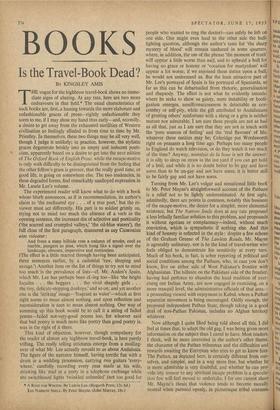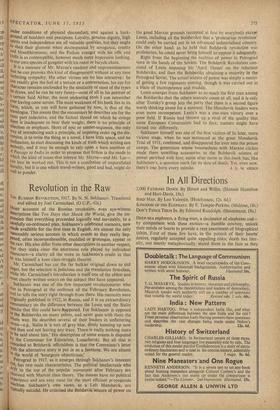BOOKS
Is the Travel-Book Dead?
BY KINGSLEY AMIS THE vogue for the highbrow travel-book shows no imme- diate signi of abating. At any rate, here are two more endeavours in that field.* The usual characteristics of such books are, first.a leaning towards the more elaborate and unfashionable graces of prose—rightly unfashionable they seem to me, if I may show my hand thus early—and, secondly, a desire to get away from the exhausted sterilities of Western civilisation so feelingly alluded to from time to time by Mr. Priestley. In themselves, these two things may be all very well, though I judge it unlikely; in practice, however, the stylistic graces degenerate briskly into an empty and indecent poeti- cism, apparently based on a desire to get into the next edition of The Oxford Book of English Prose, while the escape-motive is only with difficulty to be distinguished from the feeling that the other fellow's grass is greener, that the really good time, or good life, is going on somewhere else. The two tendencies, in these degraded forms, find remarkably unalloyed expression in Mr. Laurie Lee's volume.
The experienced reader will know what to do with a book whose blurb announces, as if in recommendation, its author's claim to 'the enchanted eye . . . of a true poet,' but the re- viewer must act differently. His part is to soldier grimly on, trying not to mind too much the absence of a verb in the opening sentence, the incessant din of adjective and poeticality ('the scarred and crumpled valleys,' the oil-blue Waters'), the full close of the first paragraph, mannered as any Cicaronian esse videatur: And from a steep hillside rose a column of smoke, cool as marble, pungent as pine, which hung like a signal over the landscape, obscure, imperative and motionless.
(The effect is a little marred through having been anticipated, three sentences earlier, by a cadential 'raw, sleeping and savage.') Another item on the list of things to try not to mind too much is the prevalence of lists—cf. Mr. Auden's Spain, which Mr. Lee has perhaps been cf.-ing too—like 'the bright facades . . . the beggars . . . the vivid shapely girls . . . the tiny. delicate-stepping donkeys,' and so on; and yet another one is the 'striking' image—'fragrant as water'—which at first sight Seems to mean almost nothing, and upon reflection and reconsideration is seen to mean almost nothing. One way of summing up this book would be to call it a string of failed poems—failed not-very-good poems too, for whoever said that bad poetry is much more like poetry than good poetry is, was in the right of it there.
This kind of objection, however, though compulsory for the reader of almost any highbrow travel-book, is here purely trifling. The really telling strictures emerge from a mulling- over of what Mr. Lee actually reveals to us about Andalusia. The figure of the narrator himself, having terrific fun with a drum in a wedding procession, carrying two guitars 'every- where,' carefully recording every pass made at his wife, drinking like mad at a party in a telephone exchange while the switchboard lights 'twinkled unheeded' (not too good for • A Rost.' OR WINTER. By Laurie Lee. (Hpgarth Press, 12s. 6d.) 111E NARROW Smit.l. By Peter Mayne. (John Murray, 18s.) people who wanted to ring the doctor)—can safely be left on one side. One might even haul to the other side the bull- fighting question, although the author's taste for 'the sharp mystery of blood' will remain unshared in some quarters. where, in addition, the use of the phrase 'the moment of truth' will appear a little worse than nail, and to upbraid a bull for having no grace or honour or 'vocation for martyrdom' will appear a lot worse; if we enjoined these duties upon a bull, he would not understand us. But the least attractive part of Mr. Lee's portrayal of Spain is his portrayal of Spaniards, so far as this can be debarnacled from rhetoric, generalisation and rhapsody. The effect is not what he evidently intends; where he seeks to show us gaiety, mere instability or hooli- ganism emerges, unselfconsciousness is detectable as cox- combry or self-pity, while the gift attributed to Andalusians of greeting others' misfortune with a shrug or a grin is neither mature nor admirable. I am sure these people are not as bad as all that, just as I am sure that they are not in touch with the 'pure sources of feeling' and the 'real flavours' of life. whatever these entities may be; Coleridge put Wordsworth right on 'peasants a long time ago. Perhaps too many people in England do watch television, or do they watch it too much of the time? Anyway, nostalgic de la boue is not the answer: it is silly to sleep on straw in the inn yard if you can get hold of a bed; and while it is no doubt better to be gay and have sores than to be un-gay and not have sores, it is better still to be fairly gay and not have sores.
Turning from Mr. Lee's vulgar and sensational little book to Mr. Peter Mayne's straightforward account of the Pathans is a relief not to be lightly underestimated. At first sight. admittedly, there are points in common, notably this business of the escape-motive, the desire for a simpler, more elemental existence, but The Narrow Smile does at any rate propound a less lethally familiar solution to this problem, and propounds it without egotism or complacency—indeed, without much conviction, which is sympathetic if nothing else. And this kind of honesty is reflected in the style: despite a few echoes of the Graham Greene of The Lawless Roads, Mr. Mayne is agreeably unliterary, nor is he the kind of travel-writer who feels obliged to demonstrate his sensitivity at every turn. Much of his book, in fact, is sober reporting of political and social conditions among the Pathans, who, in case you don't know, live on either side of West Pakistan's frontier with Afghanistan. The hillmen on the Pakistani side of the frontier. having had perforce to abandon the local tradition of exer- cising our Indian Army, are now engaged in exercising, on a more tranquil level, the administrative officials of that area--- a proceeding viewed with enjoyment in Kabul, where a Pathan separatist movement is being encouraged. Oddly enough, the proposed independent Pathan State, though taking in a good deal of non-Pathan Pakistan, includes no Afghan territory whatever.
Now although I quite liked being told about all this, I did feel at times that, to adapt the old gag, I was being given more information on the subject than I cared to have. Most readers. I think, will be more interested in the author's other theme. the character of the Pathan tribesman and the difficulties and rewards awaiting the European who tries to get to know him. The Pathan, as depicted here, is certainly different from our- selves, and simpler, and in a way more free, but whether he is more admirable is very doubtful, and whether he can pro- vide any answer to any spiritual escape problem is a specula- tion few will feel moved to undertake. I for one cannot share Mr. Mayne's thesis that violence tends to become morally neutral when pursued openly, in picturesque tribal costume, under conditions of physical discomfort, and against a back- ground of boulders and precipices. Loyalty, genuine dignity, high spirits and independence are all valuable qualities, but they ought to shed their glamour when accompanied by arrogance, cruelty and bloodthirstiness; and the Pathan avenger with his rifle and knife is as contemptible, however much more impressive looking, as our own species of gangster with his razor or bicycle chain. It is a measure of Mr. Mayne's candour and unpretentiousness that he can provoke this kind of disagreement without at any time forfeiting sympathy. His other virtues are no less attractive: he can readily give the feel of a terrain or a conversation, his eye for character remains unclouded by the similarity of most of the types he draws, and he can be very funny—most of all in his portrait of a certain Said Akbar, the most endearing snob I can remember ever having come across. The main weakness of his book lies in its form, which, as you will have gathered by now, is that of the travelogue. This means that the encounters he describes arc for the most part indecisive, and the factual thread on which he strings them is inadequate to bear their weight; there is no principle of selection or emphasis. Short of epic or sonnet-sequence, the only way of introducing such a principle, of imposing order ot) the dis- cursive, is to write the thing as a novel. I have little space, and no inclination, to start discussing the kinds of truth which writing can embody, and it may be enough to rely upon a bare mention of 4 Passage to India in order to propose that fiction is the mode in which the kind of issues that interest Mr. Mayne—and Mr. Lee— call best be worked out. This is not a conclusion of unparalleled novelty, but it is one which travel-writers, good and bad, might do well to ponder.



































 Previous page
Previous page